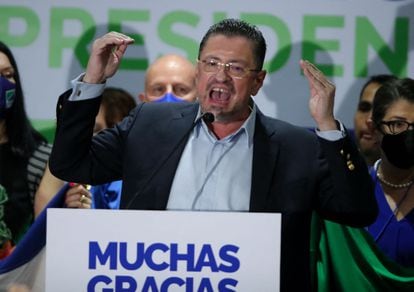The former president of Costa Rica, José María Figueres, and the former Minister of Finance, Rodrigo Chaves, will face each other in the ballot for the presidential elections in Costa Rica on April 3, after prevailing in a first round this Sunday, in which the vote was shown highly fragmented among 25 candidates. With close to 90% of the votes counted, Figueres, from the historic National Liberation Party (PLN) -from the center-, obtained 27.3% of the support compared to 16.7% for the economist Chaves. The center-right politician has managed to impose himself as a surprise candidate with a law and order speech by two points difference to the third contender, the evangelical preacher Fabricio Alvarado.
After elections that registered the highest abstention in 60 years —more than 40% of Costa Ricans stayed at home—, Figueres and Chaves opened their doors to possible alliances with other political groups for the second round, in which they will also have to fight the apathy of the population. These are the two candidates who will compete for the presidency of Costa Rica:
José María Figueres, the inheritance of power that advances between suspicions
José Figueres Ferrer, alias Don Pepe, led the last armed revolution in Costa Rica (1948). He won, governed, abolished the Army, won two elections and died in 1990, leaving one of the deepest marks on the State of Costa Rica. His son José María was born in 1954 in that home full of power and gunpowder, he grew up with the enormous weight of his last name, he graduated from the West Point Military Academy and governed Costa Rica four years after Don Pepe, as he calls him, died. same.
In that government he did what he could between momentum and inexperience, but his political career did not end there. He left power at the age of 43 and before the age of 50, when he was director of the World Economic Forum in Davos, she was on the front page of the newspapers. Former President Figueres and his circle had charged 2.7 million dollars to the French telephone company Alcatel for an alleged consultancy that had the appearance of political influence to win contracts with a state company that his father had created half a century ago. Figueres lost his job in Davos.
Join EL PAÍS to follow all the news and read without limits.
subscribe
While in Costa Rica questions were burning against him and other former presidents for similar cases (a breaking point for the two flags of bipartisanship), he settled in Spain, where in 2008 he obtained nationality due to the Catalan heritage of his grandparents. The case did not go to trial and four years later he returned to Costa Rica to prepare the ground for a re-election that he is now close to.
With more than 27% of the votes, Figueres has won the first round and thus goes to the April ballot which forces him to redouble efforts to overcome the questioning of a sector that no longer trusts him and probably will not do so again. “A judge has never called me”, he has repeated a thousand times in the campaign.
Among his voters he has been able to penetrate his experience, the Figuerista nostalgia of the elders and the dispersion of the opponents. Also the promise not to join the liberal efforts against the voluminous Costa Rican state, which Don Pepe also forged, and some environmentalist positions, a nod to new generations. “Don Pepe abolished the Army. This Figueres that is here, with a group of brave people, we want today to abolish the exploration and exploitation of oil and natural gas in Costa Rica”, he said in his last debate on Friday and posted on his social networks.
His sister, Christiana, manager of the Paris Agreement against climate change in 2015, could help him, but both are estranged due to a conflict of family inheritances that have led to their social networks, followed by celebrities such as Leonardo DiCaprio or the English billionaire Richard Branson , friends of each. The controversy has fueled the life of the presidential candidate as much as the closeness to power, the one that awaits him as of May 8 if he manages to win in the second round. That promised on Sunday before the tomb of his father, at the family farm The struggle, where the boy José María played while his father and his mother, the Danish-American Karen Olsen, took care of state affairs. On April 3, if he manages to gather the necessary support, he could say that a Figueres is back.
Rodrigo Chaves, the surprise candidate
“We are going to a second round, yes. The new party, the youngest of this campaign. But we are going to leave behind the fires, the conflict, the sterile confrontation.” This is how the presidential candidate spoke when it became known that he was the surprise winner of the second place in the elections on Sunday in Costa Rica, which gives him the pass to the ballot on April 3 against former president José María Figueres. The name of that candidate is Rodrigo Chaves, an unknown in Costa Rican politics until two years ago when he took the position of Minister of Finance with a doctorate in Economics and recently emerged from a high position in the World Bank.
The question then was why President Carlos Alvarado appointed an unknown to him and from the entire country to manage the most sensitive ministry of the Government. Only a few months later, he left in the midst of conflicts and launched a presidential candidacy hand in hand with the journalist Pilar Cisneros, who was famous for her bitter speech against the political class that she launched for years from the main news in the country. .

Chaves left the World Bank just a few days after learning that he had been sanctioned for inappropriate sexual conduct against young women officials of the institution. He was a “known stalker”, according to a testimony collected by an administrative court of the WB, which went further to determine that the punishment had fallen short as it was “a documented pattern of harassment that lasted at least four years and involved six women”, published in October 2021 The Wall Street Journal based on case documents. The American newspaper confirmed what the local press had already disclosed and that allowed to suspect the reasons for the rare return of Rodrigo Chaves to his country after several decades working for the World Bank in Asia, with much higher income and less tension than in the post in government.
Later, Chaves, now a challenger candidate for the political system, said that he returned to take care of his sick mother, that they never experienced any harassment against him and that the complaints were due to jokes that were misunderstood or a lack of understanding of his Latin American character. For this reason, he faced varied criticism and anger for his crude or ordinary ways, including the televised moment in which he questioned a lawyer candidate about her “intellectual capacity” to read the sentence of the case of alleged harassment in the Bank. World.
Criticism rained down on him on social media. They called him macho and arrogant, but in the non-virtual world, the reality is different: Chaves entered the second round 10 days after the most reliable polls placed him in fifth position. The surprising container of Figueres is a 60-year-old economist who champions popular discontent with political parties and the functioning of the State. Doctor in Economics from the University of Ohio, in the United States, he only has six months of experience in public office in his country thanks to President Alvarado, who asked him to resign in May 2020 and who now receives the harshest criticism from him. .
Chaves accuses him of leaving a “disaster” in the country’s economy (which grew 7.6% in 2021 after the -4.5% blow in 2020 from the pandemic) and of “benefiting powerful sectors of the economy”, the same reproach with which he justifies the publications of the local press on the denunciations of sexual harassment. After dealing with several parties between 2020 and 2021 to launch his electoral candidacy, Chaves found refuge in the newly created Social Democratic Progress (PSD) together with his inseparable Cisneros, whose name the candidate chanted this Sunday before supporters when he found out he had won the quota in ballot. “Piiilar, Piiilar! Who does not know her? ”, He exclaimed about the journalist of Peruvian origin, already retired.
It was in that speech that he asked his rival Figueres for “a tall campaign”, as if foreseeing that in the next two months criticism of his behavior towards women will intensify. It will undoubtedly be an element of confrontation and fire, since Chaves is willing to answer with his harsh speech against the traditional parties (none as much as that of Figueres) and their neighborhood forms in the style of his campaign phrase: “I eat the anger”, which in the streets of Costa Rica is just an ordinary uneducated way of saying: “I don’t face problems”.
The problems are basically the management of the economy in favor of “a few businessmen” and the lack of guts to clean up state institutions, he says. He promises that with some decrees at the beginning of his eventual government, he will lower the cost of living by attacking de facto monopolies of industries that affect the price of basic goods or public service rates. “Populist”, critics of him tell him, among other stronger insults that have been dedicated to the candidate. It is difficult for him to define his ideology or that of his proposal, since he, Cisneros and the PSD structure did not know each other until only a year ago.
“He is a social conservative and an economic liberal. It can be said that he is from the right, but with a heavy-handed discourse, ”said political scientist Rotsay Rosales, a researcher at the University of Costa Rica. An example is the phrase that he uses to describe the type of sanction that will apply to companies that commit corruption in contracts with the State: “death penalty,” he said on television. When they ask him about his team to govern, he says that they should first vote for him and then you’ll see, that he has a doctorate in Economics. His words try to get closer to neighborhood forms even though he paid almost 1 million dollars for his house, according to the local press, and his two vice-presidential candidates are called Stephan Brunner Neibig and Mary Denise Munive Angermuller, in the country where the most common surname is Rodríguez and the names, José and María. These forms, the impulse of Cisneros and the apparent desire of the population to bet on new proposals earned Rodrigo Chaves his ticket to the second round with 16.6% of the votes, but with only 7.4% of the voters. registered in the registry.
Starting this Monday, he has eight weeks to find a way to respond to “powerful groups,” his favorite phrase to justify questioning or to question rivals, although his campaign financing is also under investigation. In his favor leans the population frustrated with traditional politics, the one that accredits him as a wise man in matters of the economy that overwhelms thousands of homes and the one that wants to see in power a man of almost 1.90 who does not know tired of promising “law and order.”
Subscribe here to newsletter of EL PAÍS America and receive all the informative keys of the current affairs of the region
#Figueres #Chaves #heir #power #candidate #challenges #system #preside #Costa #Rica



/s3/static.nrc.nl/wp-content/uploads/2024/04/web-1704econest2.jpg)



